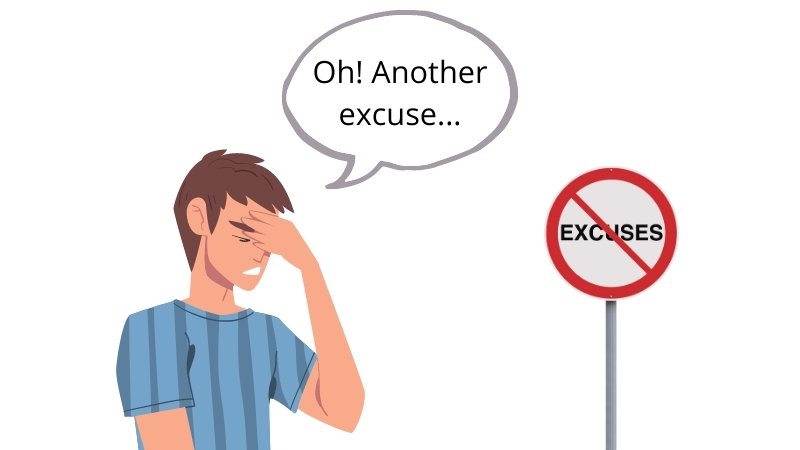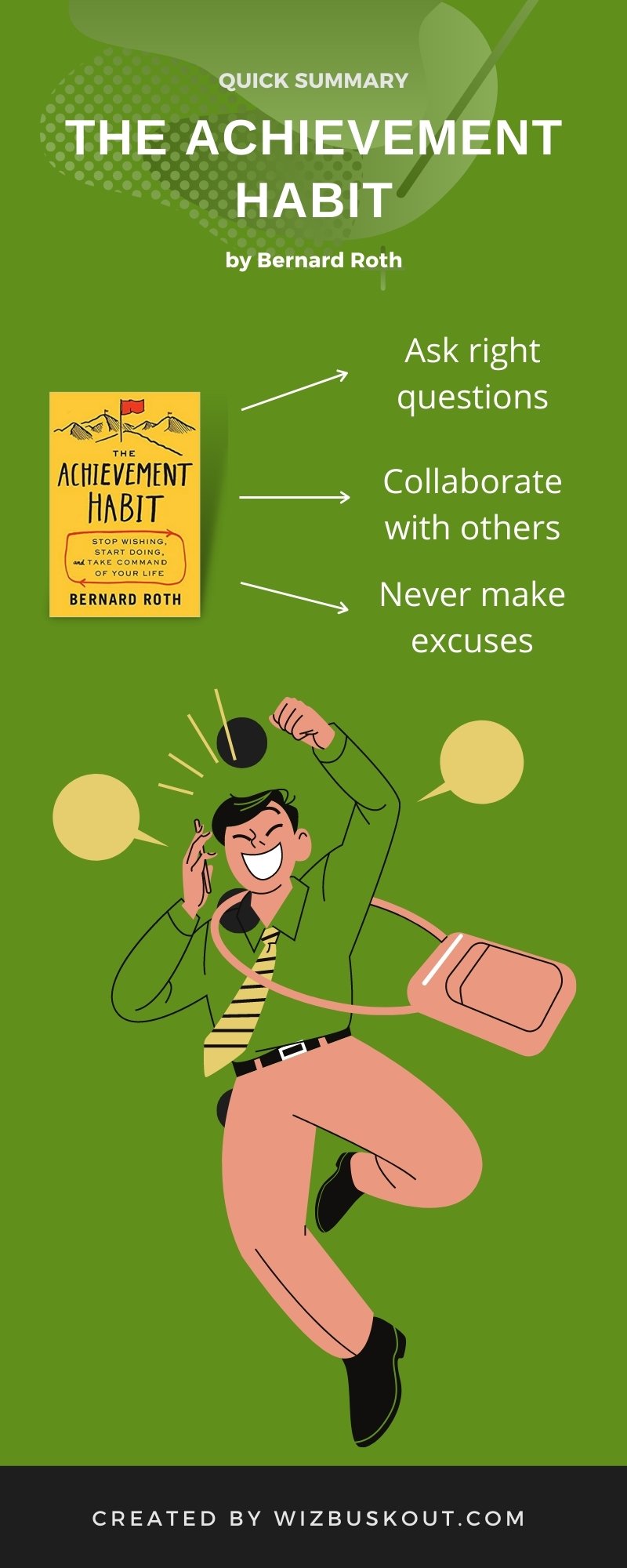The Achievement Habit by Bernard Roth explains how you can make achievement a habit by giving up your limiting beliefs and give a new meaning to your life through understanding and design-thinking.
The Achievement Habit Summary (PDF)
In this book summary, I’ll share some of the best lessons I learned.
So without wasting any time, let’s dive right in!
Lesson #1: You give meaning to your life

We discussed this in one of the previous summaries too.
But anyway, let’s talk about it again.
Here is the fact:
There is no meaning to anything you perceive.
Does it sound disheartening?
Yes, no matter how much we want to say that there is a meaning to life, there isn’t one.
Yes, it’s highly debatable.
Most people won’t agree with this fact.
They would say, “There is a meaning to life.”
But is there really?
So instead of debating whether there is a meaning to life or not, we should look at who is giving the meaning.
Shouldn’t we?
Humans give meaning to everything they perceive.
So let’s clear this confusion.
Humans make meaning. We are meaning-making machines.
You see something. And then you say, “There must be a reason.”
We are not talking about science here.
We are talking about the meaning we give to the situations.
For instance:
You might say, “I want to live a life of purpose.”
Life itself has no purpose.
You are the one giving it a purpose.
So don’t expect any person or situation to give you meaning.
Now that you understand that there is no meaning and it’s created by us, you have become capable to give the right meaning to anything.
The idea here is to understand the fact that there is no pre-existing meaning.
Going back to the example:
When you say that you want to live a life of purpose, you give meaning to something which has no meaning.
Isn’t this a great ability?
Isn’t it a beautiful thing — to give meaning to meaningless things?
Yes, this is the beauty of being a human being.
As a human being, you create meaning.
When you give meaning to something, you somehow attach yourself to it psychologically.
You care about it.
So the trick here is to choose wisely what to give meaning to.
Don’t just blindly start giving meaning to anything you see.
Being wise is the key here.
Lesson #2: Watch out for the excuses disguised as reasons

Being humans, we love giving excuses.
Don’t we?
When we must do something complex, we start giving excuses.
Well, giving excuses is not a good thing. We already know that, right?
But have you wondered why we are so good at giving excuses?
And why we are bad at doing the tasks that need to be done.
Why we procrastinate?
For example:
When a teacher gives homework to his students, students often come up with various excuses.
Don’t you think that if those same students put that much effort they would have finished the homework or assignment?
So we need to differentiate between the reasons and excuses here.
We are so good at blending reasons with excuses that we don’t even realize it.
Yes, there may be genuine reasons. But we should be clear whether they are genuine or not.
The author says that reasons are shitty excuses. He says that reasons don’t mean anything.
Reasons are simply excuses for not doing the work.
For instance, let’s talk about self-improvement.
When you ask people why aren’t they putting any effort into improving their self-knowledge, they say…
“I don’t have time. I’m busy.”
Are they really?
Or are they just pretending to be busy?
Aren’t they the lazy ones who are finding excuses for not attaining self-knowledge?
Are you getting the point here?
People become experts at giving reasons (making excuses) all their lives.
They become so good that they sound logical — when all they are doing is ‘giving excuses.’
Why this is problematic?
Well, this is problematic because by not doing the actual work, they are merely delaying their growth.
They are stopping themselves from reaching their full potential.
What’s worse, they are fooling themselves with the idea that there just isn’t enough time, money, or resources.
They say..
“I had no choice.”
Suggested Read: Man’s Search For Meaning by Viktor Frankl Summary
They never tell that they had a choice. But they put it on the lower priority. They choose to do what seemed simple at that moment.
Another reason why the reasons blend in perfectly with excuses is: you don’t get to see the immediate outcomes for your choice when it comes to life.
Often the most important tasks take time to bring fruits.
When you sow the wrong seeds, it takes time to realize that you made a mistake.
Doesn’t it?
The same happens with the reasons.
Most people who love giving reasons (excuses) don’t realize that they are only making their life worse.
But wise people can make a distinction between genuine reasons and fake reasons.
Even genuine reasons only trouble you when you don’t see your locus of control.
Many things can’t be controlled in life. Consider them out of your locus of control.
You should focus on the things that are in your control.
And never make excuses.
Do the work that needs to be done.
Lesson #3: Try to ask the right questions
Most problems don’t get solved because often the questioner or the person who has the problems ask the wrong questions.
Let me explain.
Let’s say you have the problem that you are not feeling good.
So you might ask…
“Why am I not feeling good?”
But the question itself is wrong.
Why? Because you are not looking at the source of the problem.
The question you are asking merely scratches the surface of the deeper issue.
The author recommends that you ask the right questions.
Now, how can you ask the right question?
Did you notice? The question itself is wrong here.
The question should be:
“What is the right question?”
Ok, let’s make it simple: try to ask deeper level questions.
I’d suggest that you go 4-5 levels deeper while questioning.
That’s because there is no way to know before asking a question if it’s right or not.
(Or is there? If you know one, let me know in the comments.)
By asking deeper level questions, you ultimately reach a good enough answer.
Remember that the goal is not to keep asking questions all the time.
The ultimate goal is to find an appropriate solution.
Isn’t it?
Too much questioning and not doing the actual work is also a trap.
So always make sure that you are not wasting your time by asking unwanted questions.
That’s why the author recommends that you ask the right questions.
Your goals should be learning by doing.
Questioning can help you reach closer to your solution in your mind.
But that’s it…
You’ll get the results by doing the work required.
That’s because: “You learn more by doing.”
Also, the author says that you need to pay attention to detail while doing the work.
That’d ultimately solve your problem.
Use the questioning as a tool to clear up mental confusion.
But also don’t forget to do the work. It will give you even more clarity.
Lesson #4: Consider taking help and learn from everyone

There are two things here:
- Learn to take help from the right person.
- Learn from everyone — but with a grain of salt.
Let’s talk about both of these things…
The author recommends that you take help from mentors or other people if needed.
You know, it’s difficult to figure everything by yourself.
That’s why we need mentors — who can help us learn whatever we wish to learn.
Don’t think that you can do everything by yourself without anyone’s help.
It also depends on the task being done.
If the idea to be executed is a BIG one, you’ll need assistance.
Moving on to the next point, learn from everyone.
The author says that you should learn from everyone. It’s a good thing, right?
Well, I recommend that you consider with advice with a little skepticism.
When you say ‘everyone,’ you count all the bad people out there too.
Also, you shouldn’t blindly believe anything.
That’s why always make sure that you are taking advice from the right person — who really knows what he is talking about.
But also don’t go for the opposite extreme.
Don’t say…
“I don’t need anybody’s help. I can do everything by myself.”
Instead, think rationally whether you need assistance or not.
If not, it’s fine.
But if yes, then ask some expert and take help.
The author says that you should go for mini-mentorships.
That means:
You should not depend on one expert for everything.
You can also build networks that could provide you assistance in achieving your goals.
But remember:
Don’t use other people only for the sake of fulfilling your selfish goals.
Provide value to other people too.
And it’s better if you focus on building genuine relationships. (Making real friends.)
Most people build fake relationships. They use other people as a means to reach their goals.
This is one of the worst ways of living.
Always think ‘Win-Win.’
Read: The 7 Habits Of Highly Effective People by Stephen Covey Summary
Lesson #5: “Scientific researches aren’t 100% accurate”
In one chapter, the author talks about how not all scientific researches should be treated as equal.
The idea here is:
There can be errors and biases in scientific researches too.
For example:
These days, every research paper or book uses sentences like:
- Studies show that…
- Scientists found that…
- That experiment proves that…
- It is found that…
All of such sentences are used to prove how correct they are.
No hard feelings against that…
But just because some scientist did an experiment, or just because some study says something, it doesn’t guarantee that the fact is the ultimate truth.
Scientists or researchers may be biased too.
So don’t blindly accept someone’s authority if he or she is a scientist.
Remember, all the experiments or studies are done by humans.
And you know how humans are, right?
Our senses are never accurate.
We are always conditioned with biases.
And are prone to logical fallacies.
Suggested Read: You Are Not So Smart Summary
While the other times, people have their agendas going on…
See how conditioned we are?
Whenever we listen or read that an authoritative person has proved something, we blindly accept that idea.
We say:
“Why should I do the hard work? I should simply accept it. After all, he/she is good at their job.”
We should look at our own experiences. And use our reasoning — before allowing any idea to penetrate our mind.
Yes, no matter how expert a person is at his role or profession — use logic.
Keep questioning.
Be skeptical.
Do you understand now?
Are you getting the point here?
Stop thinking in abstraction all the time.
Question the authorities.
Don’t be lazy here.
Indeed, one good idea can change your life.
But the opposite is also true: One crazy or bad idea is enough to destroy your peace of mind.
Lesson #6: Be collaborative to make things a little easier

This works best when more than 3 people are working together on a problem or project.
When you are working alone, your entire energy is used in dealing with challenges.
But when the same challenge is dealt with by more than one person, the energy drain per individual decreases.
Put simply, your burden reduces.
That’s why the author recommends mutual problem-solving.
You should try to be collaborative.
The benefit of collaboration is that you get multiple ideas and perspectives. Which helps a lot.
Have you seen when a speaker gives a speech, a lot of people sit at a distance?
Ever wondered, why?
Although they are present there, they are mentally absent most of the time.
When you sit close in a circle, you share ideas and become collaborative, says the author.
Cutting the long story short:
Consider a collaborative approach if you are working on a bigger project.
Work in groups rather than being a lone wolf.
Sometimes working alone helps.
But when the goal is big, it requires more than one mind.
You get it, right?
Another advantage of having a collaborative approach is:
You can overcome your weaknesses and use the strength of others.
Not everyone is good at everything.
So when we work in groups, we can assign roles based on individual strengths and amplify the overall results.
The Achievement Habit Quotes
Here are a few notable quotes from this that I liked:
If it’s not worth doing, it’s not worth doing well. ~Anonymous
If you always do what you’ve always done, you’ll always get what you’ve always gotten. ~Anthony Robbins
For the things we have to learn before we can do them, we learn by doing them. ~Aristotle
Insanity in individuals is something rare — but in groups, parties, nations, and epochs it is the rule. ~Friedrich Nietzsche
The Achievement Habit Summary Infographic & Takeaways
Let’s take a look at the key lessons you have learned from this summary:

- Lesson #1: You Give Meaning To Your Life
- Lesson #2: Watch Out For The Excuses Disguised As Reasons
- Lesson #3: Try To Ask The Right Questions
- Lesson #4: Consider Taking Help And Learn From Everyone
- Lesson #5: “Scientific Researches Aren’t 100% Accurate”
- Lesson #6: Be Collaborative To Make Things A Little Easier
The Achievement Habit Review
This book was a short one.
But just like many books, it had so many stories from the author’s life.
Some of them were nice.
But in the second part, the book turned a bit dull.
Maybe I feel like this because I don’t like reading too many stories.
I enjoyed the initial chapters, though.
But there wasn’t much new to learn.
You can read it once if you want.
The key idea in this book is that you should make tiny changes to your life so that you achieve great things in your life.
“Make achievement your habit!”
Now it’s your turn
I hope you enjoyed reading this book summary.
Let me know your thoughts and opinions in the comments below.
And as always, share this summary with your friends or family members.
If you got life-changing help or guidance from this summary…
Consider supporting my work by becoming a supporting member on Patreon.
